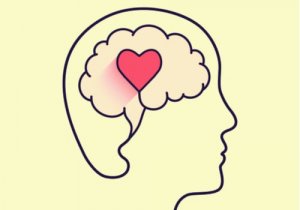Emotional Intelligence during Confinement: How it Can Help You


Written and verified by the psychologist Valeria Sabater
Using emotional intelligence during confinement can really help you. It can be a tool to manage emotions, thoughts, approaches, your concept of hope, and even your social relationships.
As Daniel Goleman points out in books such as Focus: The Hidden Driver of Excellence or his famous classic Emotional Intelligence, nothing is as important in difficult times as controlling our attention. During this difficult time, it’s quite normal to have many worries and negative thoughts that fill you with anxiety and distress.
However, you need to train yourself in patience and constructive optimism in order to accept the situation and be able to move forward. A deep understanding of the alchemy of your emotions can help you deal with these difficult days in a better way.
Emotional intelligence during confinement
An interesting study conducted at the University at Buffalo in New York by Dr. Mark Seery gives us something to think about. The things that don’t kill you but you don’t manage correctly can put you in a state of cumulative stress. This state can lead to intense psychological vulnerability. What does all this mean and how does it relate to the current context of the pandemic?
Basically, it means that millions of people will survive the coronavirus. However, coming out physically unscathed doesn’t mean that you’ll also come out emotionally unscathed. In fact, the bewilderment, everything you’ve seen and experienced, and every worry and moment of anguish will stay with you.

Emotional intelligence during confinement can help you manage this situation in a better way.
Self-awareness
What you’re feeling, your needs, and what’s really hurting you inside are things that are unknown to many. Thus, it’s important to empower yourself in the art of self-awareness.
This consists of being aware of your emotions and feelings. You need to detect what your body is feeling and what’s happening in your mind. You have to learn how to identify your emotions and accept their presence in your life. Being emotionally self-aware will help you unravel each internal reality.
Self-control
The amygdala is a small area of your brain that regulates the most adverse emotions, which are necessary and have a function.
However, sometimes, this area intensifies realities such as fear or anguish. On top of that, it does it in such a way that it completely blocks rational and reflective thinking. All of this will lead you to behave inappropriately. In this sense, it can produce panic buying, general panic, constant negativity, and a fear of what may happen tomorrow.
Thus, one of the keys to emotional intelligence during confinement that you must work on the most is self-control. You must detect your most adverse emotions and don’t allow them to intensify and take control of you.
You can achieve this if you detect the stimuli that trigger worry, fear, or discomfort. For example, instead of constantly reading news about the coronavirus, use that time to do pleasant activities, such as talking to friends and family.

Training your attention
We pointed this out at the beginning. When anxiety makes its presence felt, the mind anticipates future potential scenarios. And, in most situations, those predictions aren’t positive.
Thus, you become obsessed with what may happen in the future and with scenarios that are as scary as they are frustrating.
You must learn to train your attention by focusing on the here and now. That’s the only thing that matters.
Emotional intelligence during confinement: quality emotional connection
Working on emotional intelligence during confinement also requires relationship management. What does this mean? Basically, this means that you must have a positive emotional connection with those around you.
This is because, in these difficult days, the last thing you’ll want to do is to talk to people who intensify your worry and fear. At the same time, you must also avoid feeding anxiety in others. Thus, when you chat with relatives or friends, try to make those moments enriching. Try to be a safe haven and a beacon of hope for others.
Managing your relationships during this pandemic implies nurturing your social bonds with those who are close to you physically but also with those who are far away.
In conclusion, remember that you must train your emotions to make sure they awaken encouragement, hope, and love.
Using emotional intelligence during confinement can really help you. It can be a tool to manage emotions, thoughts, approaches, your concept of hope, and even your social relationships.
As Daniel Goleman points out in books such as Focus: The Hidden Driver of Excellence or his famous classic Emotional Intelligence, nothing is as important in difficult times as controlling our attention. During this difficult time, it’s quite normal to have many worries and negative thoughts that fill you with anxiety and distress.
However, you need to train yourself in patience and constructive optimism in order to accept the situation and be able to move forward. A deep understanding of the alchemy of your emotions can help you deal with these difficult days in a better way.
Emotional intelligence during confinement
An interesting study conducted at the University at Buffalo in New York by Dr. Mark Seery gives us something to think about. The things that don’t kill you but you don’t manage correctly can put you in a state of cumulative stress. This state can lead to intense psychological vulnerability. What does all this mean and how does it relate to the current context of the pandemic?
Basically, it means that millions of people will survive the coronavirus. However, coming out physically unscathed doesn’t mean that you’ll also come out emotionally unscathed. In fact, the bewilderment, everything you’ve seen and experienced, and every worry and moment of anguish will stay with you.

Emotional intelligence during confinement can help you manage this situation in a better way.
Self-awareness
What you’re feeling, your needs, and what’s really hurting you inside are things that are unknown to many. Thus, it’s important to empower yourself in the art of self-awareness.
This consists of being aware of your emotions and feelings. You need to detect what your body is feeling and what’s happening in your mind. You have to learn how to identify your emotions and accept their presence in your life. Being emotionally self-aware will help you unravel each internal reality.
Self-control
The amygdala is a small area of your brain that regulates the most adverse emotions, which are necessary and have a function.
However, sometimes, this area intensifies realities such as fear or anguish. On top of that, it does it in such a way that it completely blocks rational and reflective thinking. All of this will lead you to behave inappropriately. In this sense, it can produce panic buying, general panic, constant negativity, and a fear of what may happen tomorrow.
Thus, one of the keys to emotional intelligence during confinement that you must work on the most is self-control. You must detect your most adverse emotions and don’t allow them to intensify and take control of you.
You can achieve this if you detect the stimuli that trigger worry, fear, or discomfort. For example, instead of constantly reading news about the coronavirus, use that time to do pleasant activities, such as talking to friends and family.

Training your attention
We pointed this out at the beginning. When anxiety makes its presence felt, the mind anticipates future potential scenarios. And, in most situations, those predictions aren’t positive.
Thus, you become obsessed with what may happen in the future and with scenarios that are as scary as they are frustrating.
You must learn to train your attention by focusing on the here and now. That’s the only thing that matters.
Emotional intelligence during confinement: quality emotional connection
Working on emotional intelligence during confinement also requires relationship management. What does this mean? Basically, this means that you must have a positive emotional connection with those around you.
This is because, in these difficult days, the last thing you’ll want to do is to talk to people who intensify your worry and fear. At the same time, you must also avoid feeding anxiety in others. Thus, when you chat with relatives or friends, try to make those moments enriching. Try to be a safe haven and a beacon of hope for others.
Managing your relationships during this pandemic implies nurturing your social bonds with those who are close to you physically but also with those who are far away.
In conclusion, remember that you must train your emotions to make sure they awaken encouragement, hope, and love.
All cited sources were thoroughly reviewed by our team to ensure their quality, reliability, currency, and validity. The bibliography of this article was considered reliable and of academic or scientific accuracy.
- Seery, M. D., Holman, E. A., & Silver, R. C. (2010). Whatever Does Not Kill Us: Cumulative Lifetime Adversity, Vulnerability, and Resilience. Journal of Personality and Social Psychology, 99(6), 1025–1041. https://doi.org/10.1037/a0021344
This text is provided for informational purposes only and does not replace consultation with a professional. If in doubt, consult your specialist.







